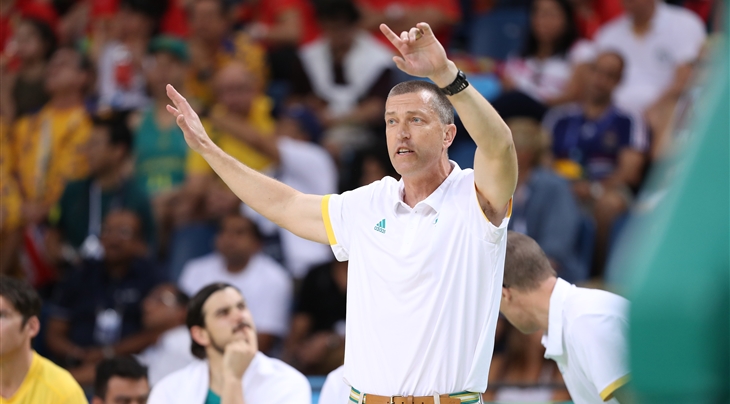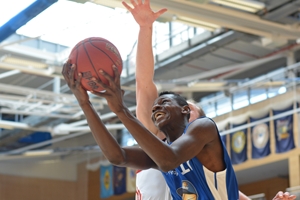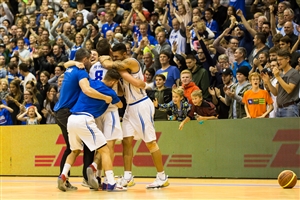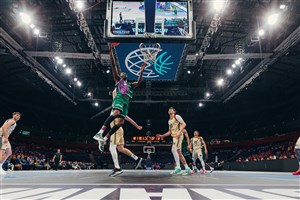
Booming, finally
MELBOURNE (Paulo Kennedy’s view from Downunder) – It was a short, honest and emotional response from Andrej Lemanis after his team had fallen to Turkey in the Round of 16 of the 2014 FIBA Basketball World Cup.
“That certainly wasn’t the plan coming in. If you’d heard my pre-game speech it was almost exactly the same from a tactical, rev-up and let’s-get-in-to-them point of view as that Lithuania game,” he said.
The question was whether the Boomers brought a less aggressive game plan to the knockout rounds than the clash with Lithuania, when they forced the Eurobasket silver medallists into 22 turnovers.
From tip-off against the Turks five days later they were a different team – cautious when guarding the ball, perimeter defenders going under ball-screens, Boomers big men hugging their counterparts rather than showing on the guards, despite the fact the Turkish frontcourt had limited pick-and-pop capability.
The Aussies didn’t attempt a proactive double team until midway through the third quarter. The final result was Turkey committing just 10 turnovers and pulling out a 65-64 win in a half-court grind, thanks to Emir Preldzic’s clutch three-pointer.
Dare to win
Of course, the reason for Lemanis’ strained voice would have been the heartbreaking nature of the loss. But as the result set in, no doubt the Boomers boss would have been struck by the fact his team didn’t dare to win.
Lemanis came into the job with a clear view of how Australia should play on the international stage. It involved tactical defensive disruption to put opposition offences into less familiar situations, quick entry into offence, and quick ball movement throughout the shot clock to make opponents defend.
In short, it was about creating a flow in the game that is familiar to players who have grown up in the Australian style of play, and avoid the controlled, half-court grinds that the best European and South American teams do so well.
But in its first real test it had come up short, and a country that hadn’t won a knockout game in men’s basketball since Sydney 2000 felt a familiar pain.
Executing the plan
Fast forward 23 months and the Boomers are taking on Spain in Rio for the nation’s first ever men’s Olympic basketball medal. There is no kamikaze about the defence, but there is a clear plan, as there has been throughout the tournament.
The Aussie guards get up and open up a channel for the Spaniards to use the ball-screen. It’s a risky play because it allows the penetrator to get into the defence, which the Spanish do time and time again.
But here’s the thing. Watch enough international basketball and you realise the top guards use screens to get into the defence no matter what opponents do. The Boomers strategy allows the help defence to be ready, but more importantly for Australia it tempts the opposition to play quickly.
You see, since the 2000 Olympics, the Boomers are 1-9 in games against quality European and South American teams where 150 points or less were scored. When the total passes 150, the Aussies are 8-8. That’s why they have to dare to win.
Turning defence into offence
There is more to the defensive strategy than I outlined – more than I’m able to comprehend, however some of the guards’ work in the passing lanes deserve special mention, as does the entire team’s preparedness to rotate proactively – but the fact was in Rio the Boomers forced teams out of their comfort zone in seven of their eight clashes.
How successful was their strategy against the powerful Spaniards? The Boomers scored 88 points, and their defence was a big part of that. Some saw giving up 89 points in that game as bad defence, I saw it as executing a courageous plan and giving themselves a chance to win, which many believe they deserved to.
Since 2006 only two teams have scored more than that against Spain in almost 100 games – the USA twice in the finals of the 2008 and 2012 Olympics, and Italy in a pool game of the 2015 Eurobasket. The point being it isn't easy to successfully goad Spain into that style.
Letting it flow
There was a flow to that game that was very Australian, and the reality we saw in Rio is when the Boomers created their preferred tempo European teams struggled to match them.
The Boomers topped Rio’s assist charts with 24.3apg, and that came about because they were aggressive from early in the shot clock and made opponents defend multiple screening and cutting situations.
Early entry came from kick-ahead passes, ball-screens in transition or hand-offs after screening action to free up the guard receiving the ball. That shifted the help defence early and opened up the lightning cuts of Patty Mills, the passing skills of Andrew Bogut and ball-screen situations after ball movement for Matthew Dellavedova to exploit.
The players executed the plan so well that the Boomers took almost 90 per cent of their two-point attempts from inside the paint. They managed that with their bigs attempting just 20 three-pointers between them, utilised as screeners and passers to force their defenders away from the basket rather than as conventional ‘stretch bigs’.
The journey
Lemanis’ offensive journey with the Boomers reached a great place, but seemed to have more twists and turns than his defensive one. Ironically, it ended up back where he started as a head coach, incorporating many of the concepts that have been successful for New Zealand basketball.
As Lemanis revealed after the tournament, he also embraced ideas his players offered, understanding they play for quality coaches around the world who have taught them things that can add to Australia’s national team program.
Needless to say, the Boomers performance in Rio – defeating Serbia, France and Lithuania, chasing the USA to the finish line and being desperately unlucky not to down Spain – is the best we have ever seen from an Australian men’s team. We've waited a long time for this.
Will Lemanis continue in the job? I certainly hope so. He still has work to do. There are two areas the Boomers must fix to take gold at China 2019 or Tokyo 2020, one at each end of the floor.
The next steps
The first is the team’s counter to physical defence. It would be easy to write off the semi-final performance against Serbia as ‘one of those nights’, and there was certainly an element of that, but it wasn’t the first time Australia’s offence had been shut down.
A week before the Olympics, Brazil employed a similar tactic, physically crowding the passer, denying the first pass and using their weakside defenders to clog the lane. The Boomers didn’t have counters for that defence on that night, nor did they against the Serbs.
A similar thing happened to New Zealand in the knockout rounds of the 2010 FIBA Basketball World Cup, when Russia handed out a literal beating, the Tall Blacks lacking someone who could punish such aggressive defence with scores on penetration.
Maybe by 2019 Dante Exum and Ben Simmons will be the men to make that difference. Without doubt, however, the team offence of the Aussies needs to be prepared for that approach, as other teams will certainly look to that blueprint.
The other area is defending ball-screens after movement. The Boomers’ approach of rushing the use of picks early in the offence was effective, but opponents who had a bit more patience – particularly Serbia in the final four – got some easy scores from forcing switches later in the clock.
Whether the solution is burning more time off the shot clock with some disruptive schemes, keeping opposition guards away from those situations – which the Boomers did reasonably well to Milos Teodosic in the group win over Serbia – or changing the way they defend screens after movement I don’t know. In reality, it is probably a bit of all three.
It’s a good problem to have, however, knowing your plan works and just needing to tweak some areas to get try and get yourself on the podium. So much credit must go to Lemanis and his coaching crew, and the players who committed to the Rio campaign.
Let’s hope as many of them as possible see the next four year block as another chance to do something special.
Paulo Kennedy
FIBA
FIBA's columnists write on a wide range of topics relating to basketball that are of interest to them. The opinions they express are their own and in no way reflect those of FIBA.
FIBA takes no responsibility and gives no guarantees, warranties or representations, implied or otherwise, for the content or accuracy of the content and opinion expressed in the above article.

















